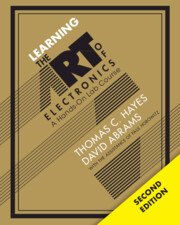Book contents
- Learning the Art of Electronics
- Learning the Art of Electronics
- Copyright page
- Dedication
- Contents
- Preface to the Second Edition
- Preface to the First Edition
- Overview, as the Course begins
- Part I Analog: Operational Amplifiers and their Applications
- 1N DC Circuits
- 1L Lab: DC Circuits
- 1S Supplementary Notes: Resistors, Voltage, Current
- 1W Worked Examples: DC circuits
- 1O Online Content: Breadboarding Hints & Tips
- 2N RC Circuits
- 2L Lab: Capacitors
- 2S Supplementary Notes: RC Circuits
- 2W Worked Examples: RC Circuits
- 3N Diode Circuits
- 3L Lab: Resonant and Diode Circuits
- 3S Supplementary Notes and Jargon: Diode Circuits
- 3W Worked Examples: Diode Circuits
- Part II Analog: Discrete Transistors
- Part III Analog: Operational Amplifiers and their Applications
- Part IV Digital: Gates, Flip-Flops, Counters, PLD, Memory
- Part V Digital: Analog–Digital, PLL, Digital Project Lab
- Part VI Microcontrollers
- Book part
- Index
2N - RC Circuits
from Part I - Analog: Operational Amplifiers and their Applications
Published online by Cambridge University Press: 18 March 2025
- Learning the Art of Electronics
- Learning the Art of Electronics
- Copyright page
- Dedication
- Contents
- Preface to the Second Edition
- Preface to the First Edition
- Overview, as the Course begins
- Part I Analog: Operational Amplifiers and their Applications
- 1N DC Circuits
- 1L Lab: DC Circuits
- 1S Supplementary Notes: Resistors, Voltage, Current
- 1W Worked Examples: DC circuits
- 1O Online Content: Breadboarding Hints & Tips
- 2N RC Circuits
- 2L Lab: Capacitors
- 2S Supplementary Notes: RC Circuits
- 2W Worked Examples: RC Circuits
- 3N Diode Circuits
- 3L Lab: Resonant and Diode Circuits
- 3S Supplementary Notes and Jargon: Diode Circuits
- 3W Worked Examples: Diode Circuits
- Part II Analog: Discrete Transistors
- Part III Analog: Operational Amplifiers and their Applications
- Part IV Digital: Gates, Flip-Flops, Counters, PLD, Memory
- Part V Digital: Analog–Digital, PLL, Digital Project Lab
- Part VI Microcontrollers
- Book part
- Index
Summary
Now things get a little more complicated, and more interesting, as we meet frequency-dependent circuits. We rely on the capacitor (or just “cap”) to implement this new trick, which depends on the capacitor’s ability to “remember” its recent history.
- Type
- Chapter
- Information
- Learning the Art of ElectronicsA Hands-On Lab Course, pp. 55 - 81Publisher: Cambridge University PressPrint publication year: 2025

